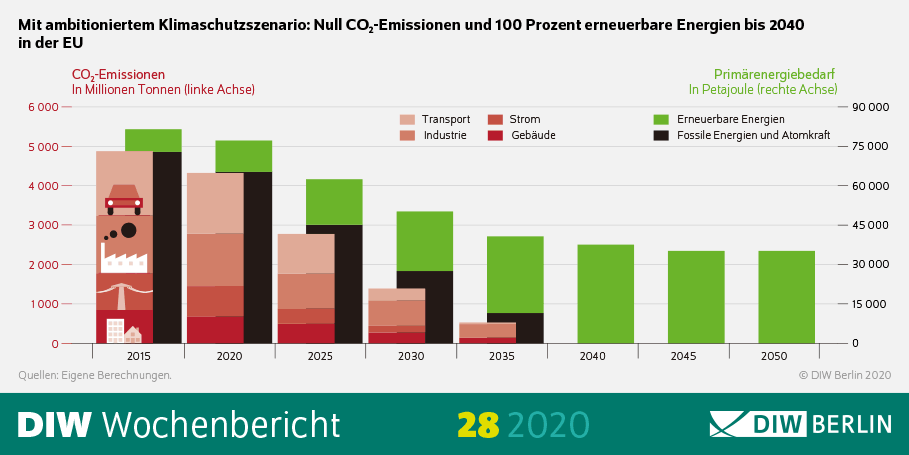CO2-Emissions should be reduced by 65 percent over the next ten years compared to 1990 in order to achieve climate neutrality - Energy system must be converted to 100 percent renewable energies by 2040 - Investment of 3,000 billion euros required to meet European Green Deal and Paris climate targets - German EU Council Presidency can ensure that Corona aid packages link economic stimulus with climate protection
The European Green Deal sets the bar very high: Europe is to become climate neutral by 2050. However, these targets can only be achieved if CO2-emissions by 2030 not only by 40 percent compared to 1990, but by 65 percent. To achieve this, energy production would have to be completely converted to renewable energies by 2040. The necessary investments are high, but they will pay off. These are the most important results of a new study by the German Institute for Economic Research (DIW Berlin). On the occasion of the German EU Council Presidency, the economists from DIW Berlin and the Technical University of Berlin involved in the study have calculated under which circumstances the goals of the European Green Deal could be achieved and what costs this would entail. "So far, the EU Commission has assumed a CO2-reduction target of 40 percent. But this will not make Europe climate-neutral by 2050, as our calculations show. The targets must be much more ambitious," says study author Claudia Kemfert.

The authors have therefore compared a baseline scenario of 40 percent with a climate protection scenario that assumes a CO2-reduction of 65 percent by 2030 compared to 1990, as demanded by some groups in the EU Parliament. In fact, the calculations show that under these circumstances, the climate neutrality targeted in the Green Deal could be achieved. "However, this is only possible if we switch our energy system to 100 percent renewables - and do so already by 2040," says study author Karlo Hainsch. Even with a complete switch to renewables, the energy supply would remain secure, as the study's hourly calculations show - even for countries that still rely heavily on fossil or nuclear energy, such as Poland and France.
"The German EU presidency could kill two birds with one stone: economic recovery and climate protection." Christian von Hirschhausen
Such a scenario would save around 60 billion tonnes of CO2. "However, a switch to 100 percent renewable energy cannot be had for free. Extensive investments will have to be made," says study author Leonard Göke. According to the calculations, the investment required for renewable energies amounts to around 3000 billion euros. This is an enormous amount, but it is offset by savings of almost 2000 billion euros alone, which would no longer have to be spent on importing fossil fuels. Since both the EU and most national governments in Europe have put together extensive aid packages because of the Corona crisis, these could form a good basis for supporting the necessary investments.
"The German EU Presidency could kill two birds with one stone: economic recovery and climate protection," says study author Christian von Hirschhausen. "To do so, it must ensure that the extensive stimulus packages under the European Green Deal are used for investments in renewable energies and energy efficiency." In addition, there is still the Just Transition Fund, which the EU has set up to provide financial support for structural change in the regions of Europe that are affected very differently by the measures. "Particular care must be taken to ensure that the funds are channelled into sustainable climate-neutral projects and not used for the de facto stabilisation of fossil fuel development paths," warns study author Pao-Yu Oei. The current economic crisis, which is setting new parameters worldwide and across sectors, could now be used to decisively tackle the necessary measures towards climate neutrality.
Source: DIW press release of July 8, 2020
Keywords: Renewable, Funding, Climate protection, Mobility, Sustainable management, News Blog Europe (without DE), Resource efficiency, Transition Town, Environmental policy




